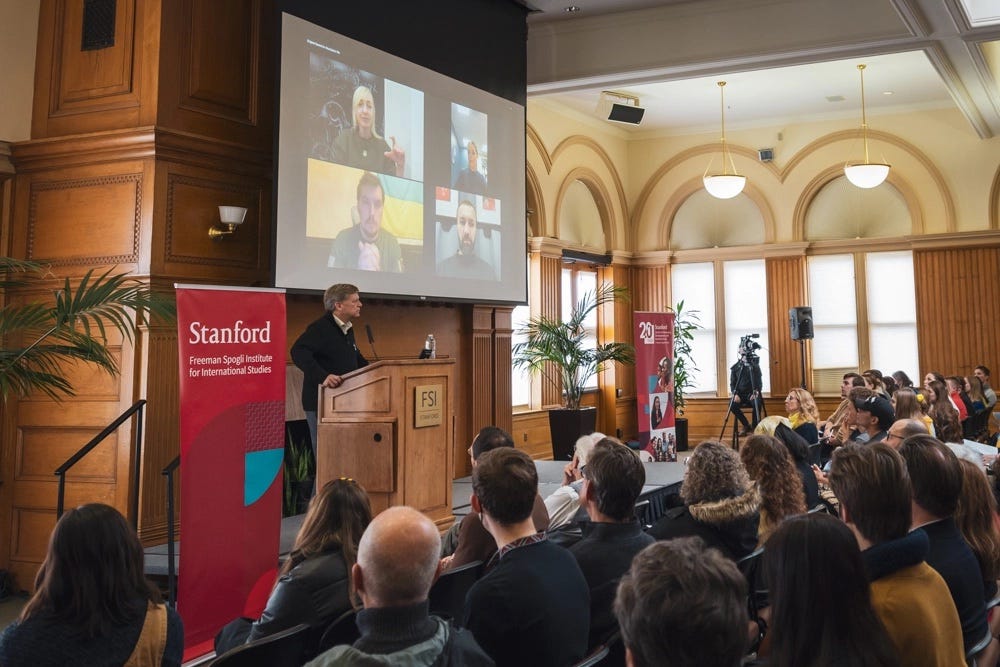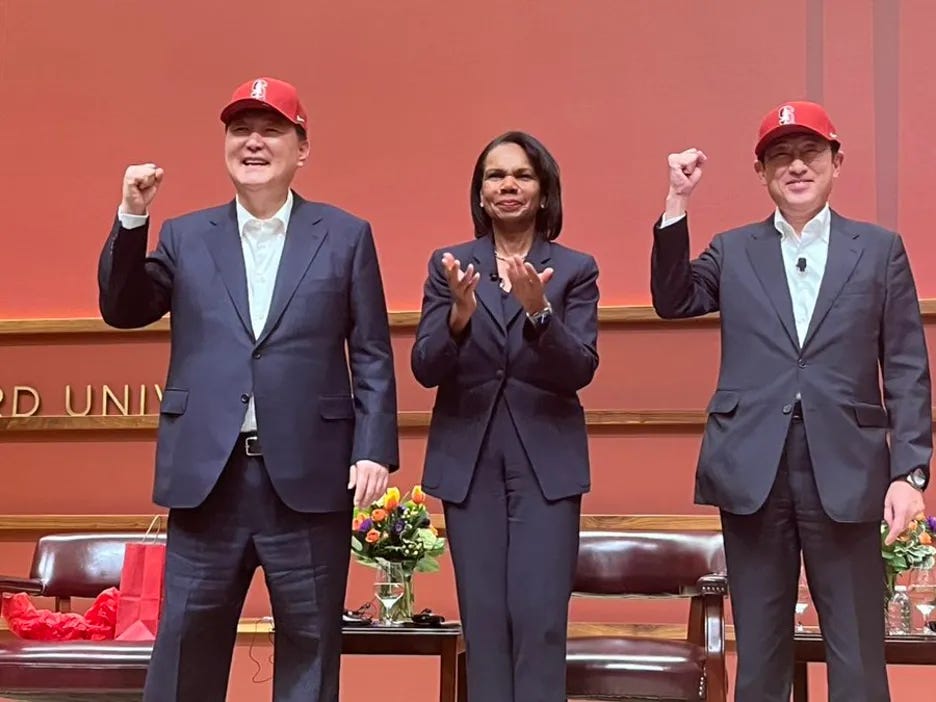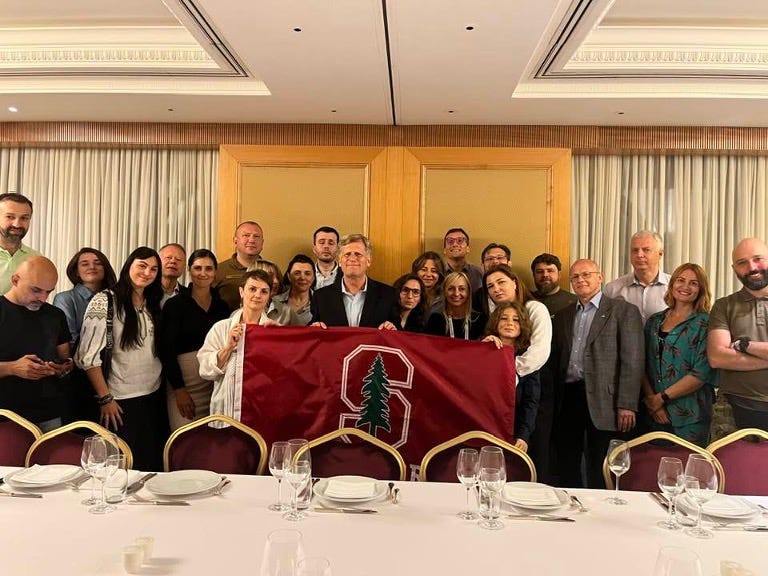McFaul’s World – 2023 Year in Review
Hoping for a more peaceful 2024!
As many of you know, since I left the government in 2014, I have been writing a monthly newsletter sharing my activities and publications, punctuated by an end-of-year “year in review” edition. With six hours to spare till 2024, I would like to share some reflections and key memories from 2023.
2023 was a hard year for the world. Tragically, Putin’s invasion and occupation of Ukraine has not stopped. The gains of the Ukrainian counteroffensive were less than hoped for, and the Russian armed forces continued to slaughter civilians indiscriminately, including just days ago, in a massive missile attack on cities across Ukraine. Inside Russia, Putin continued to deepen repression, underscoring his paranoia, and increasing the suffering of those imprisoned.
Hamas’s horrific, barbaric terrorist attack against Israeli civilians on October 7 compelled Israel to launch a major war against this terrorist organization in Gaza. Too many civilians have already died, and the war has no end in sight. Here, in the United States, the Israeli-Hamas conflict divided our politics, university campuses, and society, leading to the rise of anti-Semitism and Islamophobia. Just days after the terrorist attack, I wrote Terrorism Is Terrorism, in an attempt to reconcile the obvious need to denounce this horrific act but also find longer, sustainable solutions to this conflict. This year also revitalized other older conflicts: the Republic of Artsakh ceased to exist, falling under Azerbaijan’s control, and the civil war in Sudan wages as I write. Beyond military conflicts, Turkey, Syria, and Morocco experienced devastating earthquakes. U.S.-China relations continue to simmer, global temperatures set records, and the global democratic recession persists.
BUT, there was good news too! Against all odds, Ukrainians bravely kept up the fight for Ukraine’s freedom, European security, and democracy around the world. In 2023, despite being larger and better armed, Russian armed forces made minimal advances but endured tremendous causalities and lost tons of equipment, from tanks to jet fighters and ships. Finland joined NATO and Sweden is expected to follow suit. EU opened accession negotiations with Ukraine and Moldova and granted candidacy status to Georgia. Poland elected a new pro-EU and NATO leader, reversing a slow slide to authoritarianism there. Guatemalans also defied expectations and elected a relatively unknown, pro-democratic president. (Read the details here.) Scientific breakthroughs are happening at an unprecedented pace, global poverty is decreasing, and predictions of the American economic meltdown proved wrong, really wrong. While trying harder the reverse the bad trends, we have to celebrate the wins along the way.
Personally, 2023 was a frustrating and challenging year, especially because of the continuing horrors that Putin’s invasion of Ukraine has inflicted on so many Ukrainians, including on the family members of my friends. The Hamas terrorist attack on October 7 also directly impacted many friends and sparked tensions on our campus. But you can’t give up. You have to keep trying to do something – even if it feels so very marginal and ineffective – to reduce suffering, expand understanding, and help the good people in the world win.
For me, that meant continuing a portfolio of activities, most connected to education and research, but not only. I continued with my day job at Stanford, running the Freeman Spogli Institute for International Studies (FSI), teaching courses in Political Science, participating in research and public policy activities both at FSI and the Hoover Institution, and trying to wrap up my upcoming book, Autocrats Versus Democrats: Lessons from the Cold War for Competing with China and Russia in the 21st Century. As always, I learned a lot from my Stanford colleagues and students, especially from my spring quarter seminar on great power competition. It is a real privilege to work at Stanford, or more accurately, to be a 43rd-year student at Stanford. The memes and stereotypes I read about elite universities today have very little in common with my reality at Stanford. Come visit sometime and see for yourself!
Beyond my work at Stanford, I continued to engage in the public policy debate regarding Russia’s full-scale invasion of Ukraine. I made countless arguments for continued military assistance to Ukraine and more efficient sanctions on TV, radio, Twitter, on my Substack page, McFaul’s World, in print, and through the International Working Group on Russian Sanctions that I coordinate. I just learned today that two of my articles for the Journal of Democracy were the top two read online articles for 2023! See the full list here.
At the beginning of the year, I wrote an article in Foreign Affairs, titled “How to Get a Breakthrough in Ukraine: The Case Against Incrementalism.” In that piece, I warned that “Putin expects Western governments and societies to lose their will and interest to keep helping Ukraine.” Tragically, that turned out to be true, which is why I ended the year by publishing another piece in Foreign Policy, titled “The Case for Supporting Ukraine Is Crystal Clear. Note to Congress: Ukraine aid is not charity but serves critical U.S. interests.” I was disappointed that Congress did not approve a new assistance package last fall. I hope they get it done right away in the new year.
The U.S. and the sanctions coalition also need to do much more to impose new sanctions and improve enforcement of existing sanctions against Russia. In 2023, our Working Group wrote several papers this year explaining why and how, including a comprehensive set of recommendations in Working Group Paper #11, titled “Action Plan 2.0 Strengthening Sanctions against the Russian Federation,” published on April 24, 2023. But there was good news on the sanctions front too, including perhaps most importantly, new momentum on the idea of transferring Russian assets frozen in Western banks to Ukraine for reconstruction. Our working group spelled out that proposal on October 11, 2022, in Working Group Paper #6: “Why and How to Confiscate Russia’s Sovereign Assets to Help Rebuild Ukraine.” Imagine how much better off Ukraine would have been today if we had transferred these assets, estimated to be around $300 billion, to Ukraine back then. But better late than never. I am hoping this action could be one of the real good news events of 2024.
This year, I also stayed in close contact with many U.S. government officials, members of Congress and their staff, and my Ukrainian colleagues, friends, and students, as well as Russian opposition leaders living in exile. The paramount goal that I pursued in all of these interactions was brainstorming new and better ideas to end Russia’s invasion of Ukraine as fast as possible. That tragic war continues in 2024, so I plan to keep at it in the new year.
Through interviews on MSNBC, Ukrainian and independent Russian media channels, as well as my talks on the Causes and Consequences of Putin's Invasion of Ukraine and Why Should We Care About Ukraine, I tried to help explain the war to the general public, from Montana to Texas.
This year, I traveled to Ukraine for the first time since the war began. My trip to Kyiv in September was definitely one of my highlights of 2023! As I wrote in my trip report, I was deeply moved by the resilience, focus, ingenuity, and bravery of the Ukrainians I met – from President Zelenskyy to soldiers, friends, and students at Taras Shevchenko University. In Kyiv, I saw a defiant nation, unwavering in their determination to liberate their country from Russian occupiers. I also had a chance to meet with Ukrainian alums of our FSI programs over the last two decades and receive Ukraine’s Medal of Order of Merit, Third Degree, in person.

Back in February here at FSI, we hosted a fantastic set of events to commemorate the first anniversary of this tragic and barbaric war. My favorite one was a panel with four high-profile Ukrainian leaders (also all Stanford alums), currently based in Kyiv, who joined us to discuss the impact of the war on daily life, global democracy, and Ukraine's future. You can read more about that event and watch the recording here.

In March, we also brought together 30 scholars, economists, government officials, NGO leaders, and members of the business community for a two-day workshop to exchange and discuss concrete ideas on how to rebuild, reimagine, and accelerate Ukraine. More than half of our speakers were Ukrainians, who joined us from Kyiv via Zoom, including Mustafa Nayyem – the head of Ukraine’s State Agency for Restoration and Infrastructure Development) and another Stanford alum). It was an incredibly productive discussion, but so much more needs to be done. We will keep at it in 2024.
At FSI, Ukraine was not the only focus. We had a busy and productive year. We hosted a record number of world leaders in one year on campus, including H.E. President Sauli Niinistö of Finland and his delegation for a conversation on Finland’s role in defense and security cooperation in Europe and beyond, President of Colombia Gustavo Petro’s delegation for a discussion on climate change, former Prime Minister of New Zealand Rt. Hon. Dame Jacinda Ardern and her team for a discussion on technology governance and regulation, and the historic summit discussion with Prime Minister Kishida Fumio of Japan and President Yoon Suk Yeol of the Republic of Korea. And our scholars continue to publish numerous books and articles an virtually every topic related to international affairs. Check out our website here. I am proud and honored to lead the stellar groups of scholars at FSI.

Finally, as we head into the new year, I want to thank all of you for your support, well-thought-out comments, and terrific questions! A special thank you to my paid readers at Subtack for joining our Zoom Q&As. I always enjoy and learn a lot from our interactions and hope to do more in the new year. If you have any ideas or suggestions for how I can improve this page, please let me know in the comments below.
Chag Sameach, Merry Christmas, Happy Kwanzaa, and Happy New Year everyone! Wishing you a happy and peaceful holiday season and praying for those in difficult circumstances. And hoping 2024 will be more peaceful than 2023.
Stay tuned for more in 2024!
With warm wishes,
Mike



For a political activist in the US, what's a good guide to focusing 2024 efforts? Is there a way to crosscheck most Putin-friendly GOP congresspeople against their vulnerability?
I recently read with interest your 2023 Year in Review. As there was no mention of the arrest by the Russians of WSJ reporter Evan Gershkovich in March of 2023 I wanted to ask you to share your views on that 2023 event. Evan is an excellent journalist known for bravely poking the Russian bear. Although most press coverage of his arrest would have one believe that he was somewhat randomly selected to be “traded” by the Russians at some future date there is clearly a great deal more going on here. Evan’s Oct 26, 2020 Moscow Times article [In Russia, ‘There’s Nothing to Hide’: A Phone Call With One of Putin’s Closest Friends] certainly did not escape the personal attention of Vladimir Putin or Swiss banking regulators. The article engagingly presents the money laundering operation of Putin confident Sergei Roldugin, the man known in some circles as “Putin’s wallet”. Somewhat amusingly, Roldugin’s operation involved the purchase of overpriced musical instruments. Among them was a violin which may be the most expensive Stradivarius ever purchased. I highly recommend Evan’s article.
The sentencing of the Russian money launderers last March by the Swiss (Roldugin’s name was on the account but he was safely ensconced in Russia) was followed mere minutes later by Evan’s arrest. Putin is reported to have personally “monitored” the entire operation. This was revenge served cold.
The wall of silence surrounding the true reason for Evan’s arrest will not serve to protect Evan. It will only protect Putin and encourage more of the same. The news media and the US Government should not be standing by silently as Tucker Carlson brings Putin into our living rooms. They should be loudly presenting Evan’s true story in the hope that Putin prefers not to have his money laundering operation constantly in the spotlight.
Silence will only insure that Evan spends many more years in Russian custody while the American public remains dreadfully uninformed. We should be making noise. Lots of noise. That is what Evan would do.
Your thoughts?